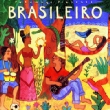|
|

Various Artists Brasileiro Putumayo World Music Whether you are already familiar with Brazilian music or this is your first time listening to this fascinating and rhythmic genre of World Music, Brasileiro will most definitely appeal to your taste. Compiling a multi-artist release can be a difficult task, especially when there are already several other compilations in the market. Nevertheless, Putumayo World Music has assembled some of the best songs and performers in the varied repertoire of Brazilian rising as well as well-known stars, such as Beth Carvalho, Martinho da Vila, and Chico Buarque. It also includes some Brazilian performers living outside of Brazil. Brasileiro opens with three tracks performed by artists probably mostly unknown to many Brazilians: Silvia Torres, Celso Machado, and Nazaré Pereira. They have more in common than the mere denominator that they are making their careers outside of Brazil. They are artistically representing Brazil and taking Brazilian music to the corners of the world. Silvia Torres opens with Carlinhos Brown's Take Saravá, a song filled with Brown's characteristic English and Portuguese word play and rhythm. However, contrary to most of Brown's percussive arrangements, the guitar solos here are definitely distinct and invigorating. They will remind you of João Bosco's style, who is also present in the CD. With Celso Machado's own Despedida (Farewell), a Brazilian northeastern influence is more apparent, even though Machado is a São Paulo native. Born in a musical family, Machado has always shown a fascination with Côco, Embolada, and other Brazilian folkloric styles. Yet another folkloric style, a Bumba-meu-boi is sung by Nazaré Pereira in Almizinho Gabriel's Clarão de Lua (Moonlight Ray). After this brief introduction, Brasileiro brings more well-known names in Brazilian music. With the same freshness and appeal in the arrangements, all tracks contain a certain edge in each performer's rendition. Take, for example, João Bosco's performance of Dorival Caymmi's Vatapá (the name of a Bahian dish). Bosco is capable of using his vocal techniques and guitar artistry to give Vatapá a more African-Brazilian feel. A similar innovative arrangement is found in Tom Jobim's Águas de Março (Waters of March). Following the steps of the Bossa Nova master João Gilberto, Rosa Passos takes this song a notch higher. The soft drum and guitar introduction in Canto das Três Raças (Song of the Three Races) is the beginning of a Brazilian history lesson in the voice of the late samba singer Clara Nunes. The lyrics allude to the Portuguese, native Brazilian, and African races that form the Brazilian nation of today. The samba is infectious and irresistibly danceable. A rising star, Chico César, continues this history lesson with his own reggae tribute to Africa in Mama África (Mother Africa). The journey progresses with Forró, samba, and choro. As with other Putumayo releases, extra care is taken with every aspect of a CD, from the cover design to the comprehensive liner notes. Brasileiro is no exception. The beautiful art work by Nicola Heindl stands out and instantly catches your eyes. It also serves as an introduction of what you will find when you play the CD. The cover depicts elements and scenes from all regions in Brazil, a theme explored in the music presented here. Liner notes are a great companion to the excellent music presented in the CD, with the inclusion of short bios and song summaries. Brasileiro is an outstanding compilation of substance and seduction with a colorful and rhythmic portrait of Brazil's vast musical history. Copyright © 1999 Egídio Leitão
|
| © 2011 Luna Kafé |